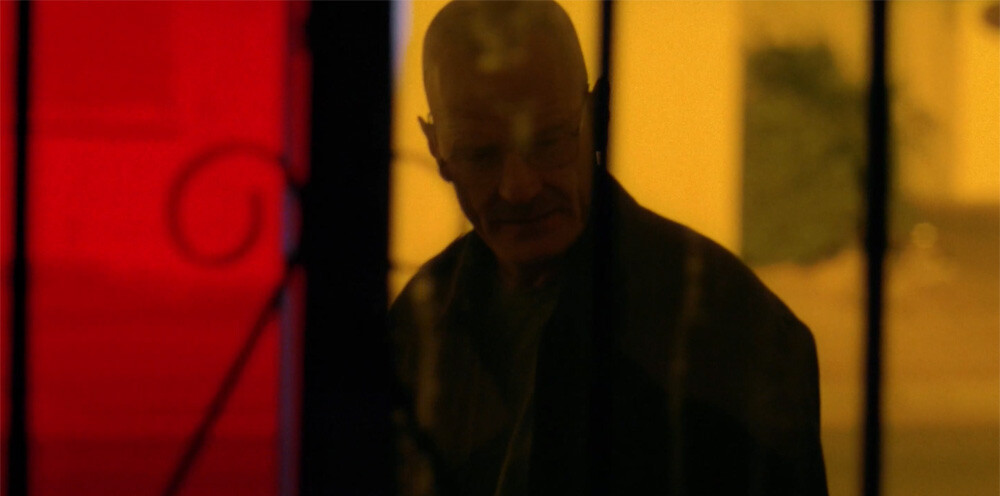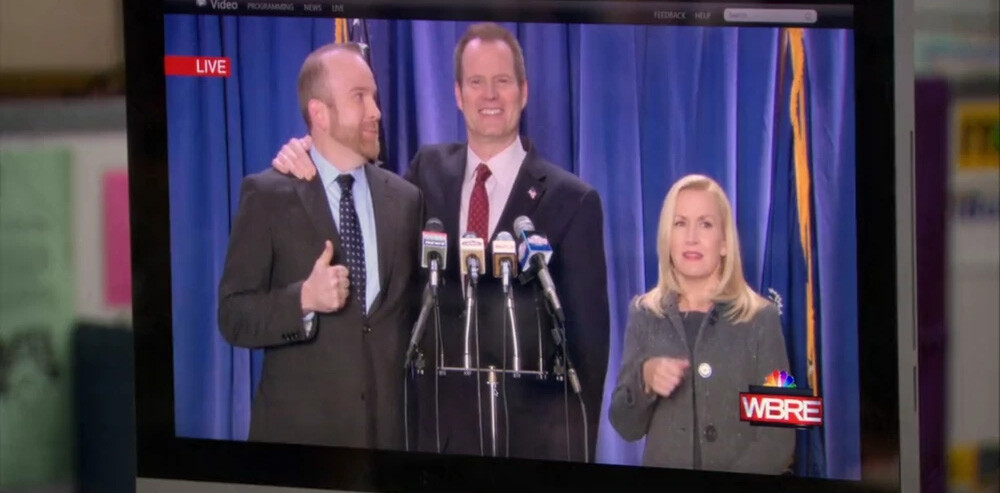4 TV Characters Who Act Way Poorer Than Makes Sense

We’ve pointed out before that characters on TV act richer than normal people. Even when explicitly poor, they live in huge homes. They travel the world with no worries about the cost. They talk about dire financial straits, but few of them ever seem to really land into money trouble long-term. Clearly, the writers don’t understand poverty.
Sometimes, however, TV characters do experience hard money trouble, and this also paints the writers as ignorant about poverty. Because these characters flounder and refuse to use some very obvious options open to them. Yeah, we all keep complaining about how life in America is tough, but people actually have all kinds of protections, ones you wouldn’t know about from watching TV.
'Breaking Bad' Brushes Right Past The Fact That Walt Has Insurance
People remember Breaking Bad as that show about a guy who cooks meth to pay for health care. It’s actually about a guy who always had health care coverage but did not want it.
Don't Miss
Let me explain. Over and over, I’ve seen the following observation, which says the show wouldn’t work in Canada/the UK/anywhere with publicly funded medical care:
And yet health care wasn’t the reason Walt turned to crime — and I don’t just mean he really did it to feel good.
In the pilot, a doctor says Walt has inoperable lung cancer and will die in two years even with treatment. Walt now does not embark on a quest to beat cancer. He embarks on a quest for money to leave his wife and son after he’s gone. He likes this idea so much that he avoids treatment, and he still seeks to avoid it even when his family learns of his condition. During his remission, the news that he won’t die actually saddens him: He wants to die and bequest a big sum to his family. So unless Canada, in addition to paying for medical care, has a system of giving each widow $737,000 cash, Walt would be in the same position over there.

AMC
Still, I can’t blame people for associating Breaking Bad with medical expenses. Despite health care not being Walt’s original goal, his family struggles with cancer bills. Bryan Cranston himself joked that he was happy Obamacare hadn’t existed around the pilot, else the show never would have worked. Here’s the part we all seem to forget, though. Walter White had medical insurance, which covered cancer treatment.
He had this insurance because he was a public school teacher. Teachers’ extensive insurance is actually one reason their take-home pay may be so low. Though some teachers lack insurance, secondary school teachers are the best insured, and New Mexico offers better coverage than all surrounding states. As a New Mexico high school school teacher, Walt received an insultingly low salary, insufficient respect and also comprehensive medical insurance. It likely wouldn’t pay for a lavish private hospital suite, like Walt’s billionaire ex-partner could afford, and he also had trouble paying for an ambulance since ambulance rides are billed separately, but it covered chemotherapy, the sort we later see Walt receive.

AMC
If you have any personal anecdotes of teachers in Walt’s exact position whose insurance doesn’t cover chemotherapy, you should share those, because that’s important info to get out there. I’m not seeing a whole lot of stories like that. You run into the occasional tale of a teacher stuck with a huge bill for emergency care because an ambulance dropped them off somewhere out of network, but that doesn’t apply to scheduled cancer treatment. Then you might have seen this:
While that teacher (named Goodman, so it took real restraint for the media to avoid Breaking Bad jokes) struggled because he no longer drew a salary, medical bills weren’t the issue. His employer-mandated insurance paid for the chemo, even after he stopped coming into school, because it had to.
So, how does Breaking Bad saddle Walt with medical bills, even though his insurance covers cancer treatment? Does it just ignore his insurance? Do insurers turn down his claim? Do copayments, even with insurance, drain the Whites’ savings? No. Instead, Skyler goes outside their plan and contacts one of the top ten doctors in the entire country. Naturally, their insurance doesn’t cover that guy, but they pick him anyway.
We accept this, which means they wrote the show well. Excessive debate on this issue would have taken too much time from what really matters (meth). Still, it’s quite a choice.
Imagine yourself, with insurance covering your medical care, seeking an alternative that costs you hundreds of thousands, hundreds of thousands you don’t have. Not just seeking special treatment in addition to what insurance covers but discarding your paid-for care in favor of chemo elsewhere, as Walt soon does. Same deal if you live in a country with national insurance or public health care: People can still pay for private care if they can afford it, so you do see yourself doing that, if you know you can't afford it? Or maybe the joke here is that Skyler just has no head for money, what with her being a, uh, career accountant?

AMC
As a result, we get some truly absurd scenes of Walt approaching his treatment like a beggar. The scenes were already intentionally absurd, because meth magnate Heisenberg can easily afford these expenses, but they want us to forget that high school teacher Walter can afford them too.
At a payment counter, Walt asks the lady not to cash his check till Monday, and she smiles sympathetically. The scene would play a little differently if he added, “You know, my insurance covers the clinic next door, but I just like the vibe of this place.” Later, Walter Jr. makes his own basic HTML GoFundMe site. Good thing he doesn’t type, “My dad has insurance that pays for his chemo, but he doesn't want to use it. So you have to donate, or he dies!”

AMC
Hospital bills return later in the series. Hank needs treatment, Walt pays for it, and Walt later blackmails him with this. And yet Hank already did have government health care. He is an assistant special agent in charge working for the Department of Justice. “In what other country would ‘I paid for your health care’ be a menacing bribe?” asked commentators at the time. The answer: any country where even people with government health care have the option of seeking better treatment — which is, thankfully, a fair number of countries.
This plot is a sort of a do-over of Walt’s. Here, Hank’s care really is special, we get entire scenes about why his insurance falls short, and in the end, we’re convinced Hank would not have walked again but for the premium physiotherapy. But Walt? Even with all his out-of-pocket care, the cancer ends up killing him two years after his diagnosis, just like that original doctor predicted.
Angela From ‘The Office’ Is Penniless After Her Husband Leaves Her, For Some Reason
Late into The Office, Angela weds a senator, and this marriage soon falls apart. The guy was closeted, and he later comes out and abandons her. This ruins Angela, not just emotionally but financially. By the end of the season, she faces eviction. About to become homeless, she looks into living in a tent, till Oscar lets her move in with him.

NBC
True, Angela no longer has a husband, and she has lost whatever status she had as a politician’s wife. But that doesn’t mean she should now be broke. There’s this thing called spousal support. I think sitcom writers have heard of it, since all my knowledge of alimony comes from characters complaining about their ex-wives bleeding them dry. Then there’s this thing called division of assets. “When she leave your ass, she gonna leave with half,” as the old saying goes. Plus, there’s this thing called child support. Angela’s son’s birth certificate lists the senator as the father.
On the other hand, there’s also this thing called deadbeats; I’m aware of that. But if The Office knew the senator was supposed to be supporting Angela post-divorce, and he was just refusing to, you’d think they'd mention this. Seems like decent comedy fodder.

NBC
“No. He’s too busy for that. Spending his time—” (gay joke)
*Oscar looks at camera*
All those protections following divorce means even if an ex has no wealth or income, they may escape poverty. And yet Angela does have her own wealth and income. She worked and supported herself for years before marriage. She’s the head of her department, above Oscar, who makes enough to keep a two-bedroom apartment. She’s spent a lot of money on cats, true, but I always took that as evidence of how much money she has, not as a suggestion that she has little money left.
Even with zero savings, she's received six months' salary since her divorce, which should be enough to live somewhere in Scranton better than a tent. Is there a running TV joke I don’t know about that says all accountants are bad with money? Or is it just all blonde accountants?
Are we supposed to assume that upon marrying, she had to sign over all her property and future earnings to her husband, who then legally retained ownership following the marriage’s dissolution? We can’t rule this out. We don’t know exactly where in Scranton they took up residence. They may have been subject to Schrute law.
The Ultrarich ‘White Lotus’ Family Bunk Like Poor People
In The White Lotus, a family go on vacation at an expensive Hawaii resort. They’re a mother, a father, a daughter, a son, and a friend of the daughter’s. They are a party of five. They stay in a suite with one bed.
The parents get the bedroom. The two girls (college sophomores) share a pullout couch in the common space that everyone walks through. The boy, 17 years old, sleeps on the kitchen floor.

HBO
Just kidding. With sexual hijinks, that setup would actually make sense.
In the real world, some families who vacation do finagle whatever rough sleeping arrangements they can come up with. Other families are rich. These two groups share zero overlap. The Mossbachers in White Lotus fall into the latter group. Not just “TV family who go on vacation” rich but “fill the safe with jewels” rich, “forced to feel apologetic about their wealth” rich. Their richness is a repeated topic of conversation.
Even between the two groups I just mentioned sits a wide spectrum of families who go on vacation, where the most basic requirement of a hotel is to make sure everyone has a bed. A room with multiple beds would be the absolute minimum any family looks for. The next step, very reasonable, would be to book multiple rooms—probably a separate room for just the girls, since the daughter’s friend isn’t related to the rest of them. If they screwed up planning and find themselves stuck in a room with too few beds, they should phone the front desk and ask them to wheel in enough cots for everyone.
For a while, I assumed their cramped nights were some kind of plot clue. Everyone keeps talking about how rich this family is, but we peek into their private lives and see they aren’t rich at all. They're faking it! I was wrong; that wasn’t the plot. Actually, the series had no plot.

HBO
The room choice isn’t played for laughs, by the way. Oh, the situation is played for laughs. The kids find the sleeping arrangements inconvenient, and they complain. But the decision to book such a room is treated as reasonable enough, rather than something out of a surrealist Czech drama. Every other part of the show is very obvious about its jokes, with characters loudly narrating every oddity in case you missed it. The show otherwise is also very obvious in portraying the wealthy as materialistic, so I don’t know what they’re aiming for here, with this rich family who care nothing for comfort in this one single respect.
It’s like if there were a sitcom, which normally just covers mundane occurrences, and the characters spend an episode waiting to be seated at a Chinese restaurant. Except, the gang each have a piano strapped to their back. “They’re taking so long to seat us!” says one character. “I know!” says their friend. “Can’t they see we have pianos on our backs!” No one ever explains why they have pianos on their backs or treats their decision to carry pianos as weird.
Sorry, I’m terrible at analogies. That sounds like an amazing episode of television.
The ‘Shameless’ Crew Actually Get Money, Still Soil Themselves
Shameless’s Gallagher family have a confusing and contradictory history with money, one that we could never fully dissect in just one section of one article. I’m not going to try to piece together some coherent financial history for them, any more than I’d claim to know the canonical origin of the Joker. But let’s zero in on one bit of the show, in which we know for sure how much money someone makes.

Showtime
In season 9, Debbie welds, for 15 bucks an hour. The male welders make $18 an hour.
First thing you need to know is that if your workplace pays women less for the same work, you have legal recourse. You don’t need to just share articles about women making 88 cents on the dollar (or print online articles, like Debbie does, in the show’s most unrealistic move), and say that someone oughta pass a law. Someone did pass a law, 60 years ago. That well-known gender pay gap is about the positions women get versus men — if one workplace instead pays men 20 percent more for the same position and same work, that is in fact illegal, and you can get the Equal Employment Opportunity Commission to sue on your behalf.
Of course, suing’s a tough process, and maybe the EEOC would dismiss her claims, saying the guys earn more thanks to seniority. So, Debbie goes a different route. Since her boss says she earns less because women spend so much time in the porta potty, she vows to abandon bathroom breaks altogether. She will wear diapers and soil herself while working, standing right in front of the boss.

Showtime
“Just do what your heart tells you, Emma.”
Now, you might question whether this is really the power move the show portrays it as. Never mind that. I want to talk more about those diapers. Because Debbie makes the diapers herself, by chopping up several of her daughter’s diapers and sticking them together with duct tape.
Why? Why not buy diapers that are her size and so won’t leak? Or, if she wants to leak, why not dispense with the diaper altogether, which would be the real power move? The obvious answer is that she’s a Gallagher, and Gallaghers are poor, so they favor homemade solutions. But Debbie’s doing okay for herself at the moment. While $15 an hour isn’t that much, it’s a chunk more than Chicago minimum wage in 2018, when the episode takes place. Plus, she lives in a house that the family now owns outright, a household with five earners and just two dependents. She can afford adult diapers.
Is she too embarrassed to be seen buying adult diapers? Probably not, since she’s the opposite of embarrassed when filling that diaper in front of her boss. Does she make her own diapers because that’s funnier? Writers, I have faith that you could make buying diapers in a store funny. You could even leave it unclear why she’s buying them, then have her pooping in front of her boss be the surprise punchline to this story.

Showtime
This welding job of Debbie’s also costs her two toes. This sounds like the bigger deal, rather than the $15 an hour, but this actually happens in the previous season (Shameless goes through its plots quickly then moves on). Deb drops a pipe on her feet and later must amputate the broken toes. After she seeks her family’s help, her dad cuts them off while she’s sleeping and dumps the toes down the sink.
Again, don’t question the logic when the show knows it’s being ridiculous. But I want to point out that this injury of Debbie’s should entitle her to some workers’ comp, which she never gets around to claiming. This is another protection I’m sure writers have heard of, because Frank in this show used to be on workman’s comp himself. Though in his case, he was committing fraud. Maybe the writers think workers’ compensation is only a tool for scammers?
Anyway, here’s my point: The reason my search history contains the phrases “shameless debbie pees herself” and “shameless debbie toes” is that I was writing an article. You should stop asking me questions about that, and actually, you shouldn’t have even been looking at my history in the first place.
Follow Ryan Menezes on Twitter for more stuff no one should see.
Top image: AMC